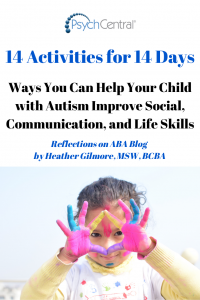

Are you a parent looking for ideas on how you can help your child with autism spectrum disorder to continue to develop and learn new things?
Do you want to help your child with ASD improve their social and communication skills and reduce problem behaviors?
Are you at home with your child daily? Or is someone else caring for your child while you work – these ideas could be helpful for your child’s caregiver, as well.
Whether you’re at home with your child or you only have a few hours a day with them (because of other life circumstances like work or education), these activities can support your child’s functioning in the area of the core characteristics of ASD including social skills, communication skills, and behaviors as well as life skills.
DAY 1: Create a daily routine. Involve your child in developing the routine if they are able to participate.
DAY 2: Create a reinforcement list. What does your child like to do? What can they earn when they follow directions, follow the routine, and accomplish tasks like chores or activities?
DAY 3: Assign one household chore for your child to complete daily. Whether you already expect your child to participate in household tasks or this is a new activity, giving your child one thing they can do daily increases independence and skills. Reward them with an appropriate item or activity from the reinforcement list you made on day 2.
DAY 4: Assess and assist your child with self-care tasks. Whether your child needs to become better at brushing his teeth or going to the bathroom or washing his body in the shower, you can evaluate what your child could improve upon and then help teach him these skills. Practice and talk about this skill today and then continue monitoring it over time.
DAY 5: One hour of relationship-building time. Instead of focusing on a demand or activity that involves telling your child what they need to do or what they are not doing well enough, just simply spend time with them. Focus on being with your child. Let them decide the activity.
DAY 6: Play a board game. Board games involve a variety of social skills. Practicing these social skills can help your child improve in this area.
DAY 7: Evaluate the week. How did the activities you and your child did this week work out? Did your child do well? What else could they improve upon?
DAY 8: Focus on one communication skill. Identify one communication skill your child could improve upon and work on it? Is your child working on speaking single words? Does your child speak verbally but need to speak more politely?
DAY 9: Practice another household chore. In week 1, you identified and supported your child as they worked on one household chore. What is another household activity that would be reasonable for your child to learn? Taking care of their dirty clothes? Feeding the dog? Wiping down the table? Consider your child’s abilities and reasonable expectations for what an appropriate goal would be for this.
DAY 10: One hour of relationship-building time. Instead of focusing on a demand or activity that involves telling your child what they need to do or what they are not doing well enough, just simply spend time with them. Focus on being with your child. Let them decide the activity.
DAY 11: Have conversations. Many children with ASD struggle in some way or another with conversations. They may not respond at all (sometimes due to lack of having verbal speaking skills and sometimes for other reasons). They may talk too much or only about their personal interests. They may struggle keeping a conversation going. Simply talk to your child at their level and gently encourage them to continue talking appropriately more than they typically would. Do this in the context of everyday activities.
DAY 12: Evaluate the last 11 days. How did the activities you and your child did work out? Did your child do well? What else could they improve upon?
DAY 13: Practice 1 to 3 of the activities you’d like your child to improve upon. Reward excessively for any progress that is made.
DAY 14: One hour of relationship-building time. Instead of focusing on a demand or activity that involves telling your child what they need to do or what they are not doing well enough, just simply spend time with them. Focus on being with your child. Let them decide the activity.
The ideas above are based on the needs and characteristics of autism spectrum disorder as well as on effective principles of learning. Be sure to consider your own child’s needs and strengths when implementing the activities suggested above.
14 Activities for 14 Days: Ways You Can Help Your Child with Autism Improve Social, Communication, and Life Skills